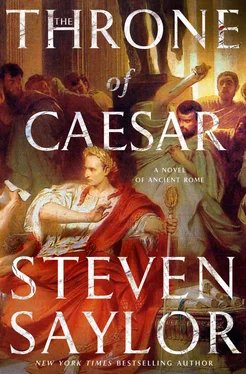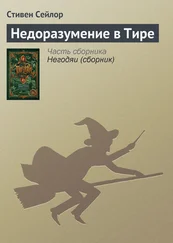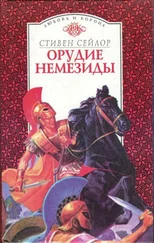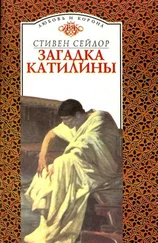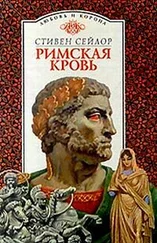Стивен Сейлор - The Throne of Caesar
Здесь есть возможность читать онлайн «Стивен Сейлор - The Throne of Caesar» весь текст электронной книги совершенно бесплатно (целиком полную версию без сокращений). В некоторых случаях можно слушать аудио, скачать через торрент в формате fb2 и присутствует краткое содержание. Год выпуска: 2018, Издательство: St. Martin's Press, Жанр: Исторический детектив, на английском языке. Описание произведения, (предисловие) а так же отзывы посетителей доступны на портале библиотеки ЛибКат.
- Название:The Throne of Caesar
- Автор:
- Издательство:St. Martin's Press
- Жанр:
- Год:2018
- ISBN:нет данных
- Рейтинг книги:5 / 5. Голосов: 1
-
Избранное:Добавить в избранное
- Отзывы:
-
Ваша оценка:
- 100
- 1
- 2
- 3
- 4
- 5
The Throne of Caesar: краткое содержание, описание и аннотация
Предлагаем к чтению аннотацию, описание, краткое содержание или предисловие (зависит от того, что написал сам автор книги «The Throne of Caesar»). Если вы не нашли необходимую информацию о книге — напишите в комментариях, мы постараемся отыскать её.
The Throne of Caesar — читать онлайн бесплатно полную книгу (весь текст) целиком
Ниже представлен текст книги, разбитый по страницам. Система сохранения места последней прочитанной страницы, позволяет с удобством читать онлайн бесплатно книгу «The Throne of Caesar», без необходимости каждый раз заново искать на чём Вы остановились. Поставьте закладку, и сможете в любой момент перейти на страницу, на которой закончили чтение.
Интервал:
Закладка:
Simonides returned with a broad smile on his face and in his hands a long, narrow linen pouch. From the drawstring that cinched the pouch dangled a tag on which I could clearly read in red letters ZMYRNA and CINNA.
“Fortuna smiles on you today, my friend. This is my very last copy of the Zmyrna. The chief scribe tells me another won’t be ready until the Ides of Aprilis.”
Meto moved to take the pouch, but I gently deflected him. “Surely, Meto, we shouldn’t take this copy. If Simonides is the exclusive seller, and will have no more after this, then for a whole month no one else will be able to purchase the Zmyrna. I shouldn’t deprive Cinna of a new reader. ”
“Papa, you are the new reader,” said Meto. “Don’t you see? This scroll was meant for you. The Fates brought us here today.”
“As for being out of stock for a while,” said Simonides, “Cinna won’t mind. He knows that scarcity adds to the book’s appeal.”
“How so?” I asked.
Cinna is happy for his words to reach only those readers capable of fully appreciating them. If a book as special as the Zmyrna is not available on a given day, such a reader will persevere, returning as many times as necessary to lay hands on the unique object of his desire. He will appreciate it all the more for the effort required to obtain it. Rarity and exclusivity only add to the mystique of a work already so rarefied and so exquisite.”
“Imagine a beautiful woman, Papa,” said Meto. “If she gives herself to every man she meets, is she any less beautiful? No. But less desirable? Almost certainly. Then imagine a beautiful woman for whom you have to wait, and who waits for only you. Is she not more desirable?”
I shook my head. “I suppose I’ll never understand great literature.”
“Maybe not,” said Meto with a laugh. “I’ll be curious to see what you make of the Zmyrna. ” He took the scroll from Simonides.
I stepped outside while Meto paid for the book. After all his talk about scarcity and artistry, I feared Simonides would demand a steep price, but Meto looked pleased with himself when he joined me in the street.
“If I told you the first price he named, you’d faint,” he said. “But when I explained who I was, and who you are—in relation to Caesar, I mean—he lowered the price considerably.”
“Meto! I wouldn’t want that fellow to take advantage of you, but on the other hand, I don’t like the idea of you bullying shopkeepers by mentioning the Dictator.”
“Papa, you misunderstand. Caesar’s books bring that fellow a great deal of business. He told me that the latest installment of the memoirs is the largest-selling item he’s ever had, and there’s no fear of running low on stock, since Caesar’s own copyists supply the shop. Simonides makes a very tidy profit on those sales. When I explained that I played a part in creating those books, he quite reasonably gave me a better price—an author’s discount, if you like.”
“You take favoritism for granted,” I said. “I suppose that I, too, will have to get used to the fawning of my inferiors once I really am a senator.”
I intended mild sarcasm, but Meto slapped me on the back and said, “That’s the spirit, Papa. Now let’s see how good a bargain we can strike on this new toga of yours.”
XX
We crossed the street and stepped into the establishment of Mamercus the tailor. The large vestibule was as sparse as the bookshop had been cluttered. Mamercus dealt in nothing but togas, so there were no women’s or children’s garments on display, and only a few pristine specimens of the shop’s handiwork hung on the walls. The floor was a mosaic of green, white, and black tiles. The geometric pattern was subtle, so as not to distract from the goods on offer, but laid with exquisite craftsmanship. We approached a long tiled counter on which was repeated the geometric pattern of the floor. The quiet shop felt very elegant and fearfully expensive.
The man behind the counter had longish red hair and was dressed in a dark green tunic with long sleeves. He was busy folding something and barely looked up at our approach. His aloofness matched the elegance of his surroundings, but Meto took one look at him and judged him to be a menial, not the proprietor. “We’re here to see Mamercus,” he said.
The clerk looked at Meto with heavy-lidded eyes. “Do you have an appointment?”
“We do not. But we do have need of the best toga maker in Rome.”
“Impossible, without an appointment.” The man reached for a large wax tablet on which a calendar of the month had been drawn. “Perhaps you could come back sometime after the Ides. Not on a holiday, of course—”
“No, we have need of Mamercus at once.”
I drew Meto aside and spoke in his ear. “Son, I can speak for myself.”
“Nonsense, Papa. Do you think Caesar ever deals directly with menials? No, and nor should you. I’m quite used to doing this sort of thing for him. Allow me to do it for you.”
Meto spoke just loudly enough for the clerk to overhear. The man took a good look at us, frowned, then turned to push open a thick wooden door and disappear into the back of the establishment. For the brief moment that the door was open, the elegant spell of the vestibule was broken by the smells that issued from the room beyond. They were typical of any tailor’s shop—the odors of dyes bubbling in metal pots, the smoke of burning dung and wood, and the mild stench of urine, an essential ingredient in every fuller’s formula for cleaning wool to a bright, lustrous white.
A few moments later the clerk reappeared, followed by a tall, clean-shaven man wearing a dark tunic. A necklace and bracelets of silver and lapis marked him as a man of wealth. He had silver hair and looked even haughtier than the clerk.
“How may I help you?” he said.
“A new senator requires a new toga,” said Meto, gesturing toward me as if I were something extraordinary to behold.
Mamercus studied me for a long moment. He was clearly unimpressed, but he spoke with caution. “A friend and supporter of the Dictator, I take it.”
“You flatter me, tailor,” I said. “I am as nothing to Caesar, but he shows favor to me nonetheless.”
“When do you need the toga?”
“On the Ides. Or better, the day before.”
“Which is the day after tomorrow. No, no, that’s quite impossible.”
“I realize I’ve come to you on very short notice,” I said. “But ever yone I’ve asked has told me that you can work miracles in speedy fashion. Marcus Brutus … Decimus Brutus … Antony…”
He twitched as I recited each name. At the mention of Antony, he twitched twice. He looked at me glumly, and I could read his face like a book: In such a world, turned upside down by war, how was a man to tell anymore who was important and who was not? Was the nondescript fellow standing before him really the confidant of magistrates and generals? Did the handsome young man with me truly move in the innermost circles of the Dictator himself? How many rude but rich Gauls had barged into his shop in recent months, announcing that they were senators and wanting a toga to match their station—barbarians who had never before worn a toga of any sort in their lives? Mamercus was the latest scion of a long family business, clothiers to generations of upstanding, respectable Romans. Many of those customers were never coming back, and neither were their offspring, exterminated by the catastrophes of war. Mamercus was not yet at ease with the new customers who had taken the place of the old.
“My name is Gordianus,” I said. “You don’t know me. Nor did you ever know my father, or anyone else in my family. I have never been to this shop. But I am, indeed, about to become a senator, and my induction will take place on the Ides. I must have a senatorial toga. There can be no investiture without proper vestments.”
Читать дальшеИнтервал:
Закладка:
Похожие книги на «The Throne of Caesar»
Представляем Вашему вниманию похожие книги на «The Throne of Caesar» списком для выбора. Мы отобрали схожую по названию и смыслу литературу в надежде предоставить читателям больше вариантов отыскать новые, интересные, ещё непрочитанные произведения.
Обсуждение, отзывы о книге «The Throne of Caesar» и просто собственные мнения читателей. Оставьте ваши комментарии, напишите, что Вы думаете о произведении, его смысле или главных героях. Укажите что конкретно понравилось, а что нет, и почему Вы так считаете.
